

ELECCIONES GENERALES 2011 en el IES García Bernalt - sacado de CLIO en red. Equipo coordinador (Alejandro Perez, Mario Gómez, Pablo Guillén, Adrián Blanco, María Andrés) Bienvenidos a este site, que hacemos público desde el comienzo de la campaña.
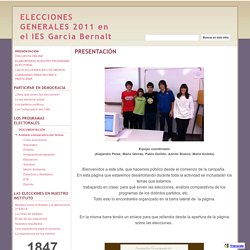
En esta página que estaremos desarrollando durante toda la actividad se incrustarán los temas que estamos trabajando en clase: para qué sirven las elecciones, análisis comparativos de los programas de los distintos partidos, etc. Todo esto lo encontraréis organizado en la barra lateral de la página. En la misma barra tenéis un enlace para que rellenéis desde la apertura de la página sobre las elecciones. También podéis ver los resultados de la encuesta a medida que vais contestándola. Esta es la página complementaria en la que están trabajando los alumnos de 4ºESO y todos los ciudadanos que quieran animarse a participar analizando el tratamiento por los medios de la campaña y cuestionando la videopolítica, la que trata a los ciudadanos como consumidores imitando las técnicas de la publicidad y el marketing. Lesson Ideas and Links. American History This course examines the history of the United States of America from 1877 to the present.
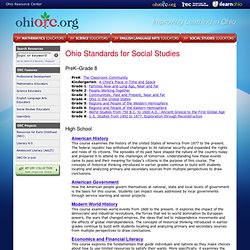
The federal republic has withstood challenges to its national security and expanded the rights and roles of its citizens. The episodes of its past have shaped the nature of the country today and prepared it to attend to the challenges of tomorrow. Understanding how these events came to pass and their meaning for today’s citizens is the purpose of this course. The concepts of historical thinking introduced in earlier grades continue to build with students locating and analyzing primary and secondary sources from multiple perspectives to draw conclusions. American Government How the American people govern themselves at national, state and local levels of government is the basis for this course. ORC On > 3-5.
According to the National Council for the Social Studies, an effective citizen is able to: Understand and embrace democratic ideals Accept responsibility for personal, family and community well-being Understand how individuals, history and traditions impact the world Understand our nation's founding documents, civic institutions and political processes Develop an awareness of issues and events that affect people Seek information from a variety of sources and perspectives to establish an opinion or solve a problem Ask appropriate questions in the process of evaluating information Use effective decision-making skills to solve problems Collaborate in an effective manner and actively participate in groups (Adapted from NCSS Position Statement, Creating Effective Citizens, May 2001) NCSS further recommends that citizenship education happen at every level, that it be assimilated across the curriculum, and that students be given various opportunities to participate in the community and school.
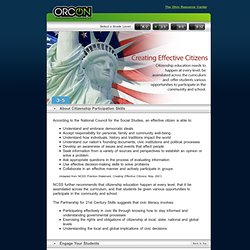
Amando de Miguel - Cataluña contra España. El conflicto lingüístico en España respira por la herida de Cataluña.
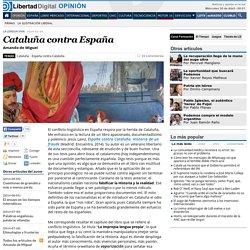
Me enfrasco en la lectura de un libro apasionado, documentadísimo y polémico: Jesús Laínz, España contra Cataluña. Historia de un fraude (Madrid: Encuentro, 2014). Su autor es un veterano libertario de esta seccioncilla, rebosante de erudición y de buen humor. Teaching Kids NewsScotland Votes To Stay In UK - Teaching Kids News. Image: David Kilpatrick/Toronto Star Scotland has voted to remain part of the United Kingdom (UK). The United Kingdom is short for the “United Kingdom of Great Britain and Northern Ireland.” It is made up of four countries: England, Wales, Northern Ireland and Scotland.
Last Thursday (Sept. 18), the people of Scotland took a vote (called a “referendum”) to decide whether they would stay as part of the UK or become an independent country. The “No” vote won—meaning, they decided not to become independent. About 55 per cent of the voters voted “no” and about 45 per cent voted “yes.” Nearly 3,620,000 votes were cast. For the referendum, people as young as 16 years old were allowed to vote. According to the BBC, the first minister said “the case for 16- and 17-year-olds being allowed to vote in all UK elections… was overwhelming and unanswerable.” The Queen of England was said to be very happy about the decision made by the Scottish people.
The Queen has not confirmed that she said that. Teaching Kids NewsJ K Rowling Against Scottish Independence - Teaching Kids News. Map of the United Kingdom.
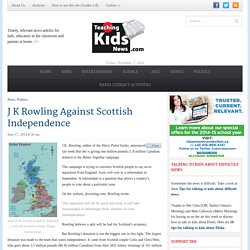
England is red and Scotland is blue. Image: Burmesedays J.K. Rowling, author of the Harry Potter books, announced last week that she is giving one million pounds (1.8 million Canadian dollars) to the Better Together campaign. The campaign is trying to convince Scottish people to say no to separation from England. On her website, jkrowling.com, Rowling wrote: This separation will not be quick and clean; it will take microsurgery to disentangle three centuries of close interdependence. Rowling believes a split will be bad for Scotland’s economy. But Rowling’s donation is not the biggest one in this fight. After 300 years, many people in Scotland say it’s time to break away from England. England and Scotland joined forces in 1603 when Scotland’s King became England’s King as well. The referendum will take place on September 18. Related linkJ K Rowling’s website featuring her essay about Scottish independence (with a Death Eater reference in paragraph five).
Election Resources.